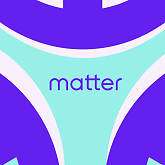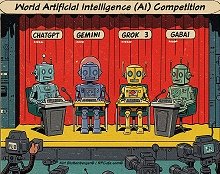Technology Standards Groups & Industry Associations
- See Full List of AI Topics -
 Matter™ is a groundbreaking, open-source connectivity standard designed for smart
homes and the Internet of Things (IoT). Officially launched in late 2022, Matter
represents the culmination of a collaborative effort spearheaded by the Connectivity
Standards Alliance (CSA), a global organization formerly known as the Zigbee Alliance.
The central aim of Matter is to streamline communication between smart home devices,
creating a unified protocol that ensures interoperability across a wide array of
ecosystems and manufacturers. Matter™ is a groundbreaking, open-source connectivity standard designed for smart
homes and the Internet of Things (IoT). Officially launched in late 2022, Matter
represents the culmination of a collaborative effort spearheaded by the Connectivity
Standards Alliance (CSA), a global organization formerly known as the Zigbee Alliance.
The central aim of Matter is to streamline communication between smart home devices,
creating a unified protocol that ensures interoperability across a wide array of
ecosystems and manufacturers.
The origins of Matter date back several years before its formal release, with
key players in the technology industry recognizing the growing complexity of the
smart home market. As various companies rolled out proprietary standards for their
IoT devices, consumers often faced challenges integrating products from different
manufacturers. To address this, an alliance formed in 2019 between some of the world’s
leading tech giants, including Apple, Google, Amazon, and the Zigbee Alliance, which
later rebranded itself as the CSA. These companies understood that the future of
smart homes required a unified approach to connectivity, one that would enable devices
to communicate seamlessly across platforms, regardless of brand.
The core creators and architects behind Matter were engineers and developers
from these founding companies. Apple’s HomeKit team, Google’s Weave developers,
Amazon’s Alexa division, and engineers from SmartThings (a subsidiary of Samsung)
were instrumental in shaping the initial architecture of the standard. Each company
brought its own experiences and insights into the design process, ensuring that
Matter was both flexible and secure.
Matter is designed to operate over existing networking technologies such as Wi-Fi,
Ethernet, Thread, and Bluetooth Low Energy (BLE). This makes it adaptable to a wide
range of devices, from light bulbs to thermostats to voice assistants. The decision
to support multiple networking protocols was critical in ensuring that Matter could
work within existing smart home ecosystems. By integrating with well-established
standards, Matter reduces friction for manufacturers and consumers alike, simplifying
the adoption of the standard.
One of the key promises of Matter is that it can be easily integrated into devices
from various manufacturers. In practice, this means that consumers who have historically
been locked into specific ecosystems—such as Apple’s HomeKit or Amazon’s Alexa—can
now freely mix and match devices without worrying about compatibility issues. For
example, a smart thermostat built by a smaller company in Denmark could seamlessly
work with voice assistants from Amazon or smart light switches developed in Japan,
all thanks to Matter.
The CSA has also placed a strong emphasis on security and privacy in Matter’s
development. By adopting modern encryption standards and ensuring that devices can
be updated over-the-air, Matter ensures that users’ data and networks remain secure
in an increasingly connected world. This focus on security was a priority for companies
like Apple, which has long emphasized user privacy, and Google, which had previously
faced scrutiny over data security practices.
Countries around the world have responded favorably to Matter’s potential. In
the United States, tech companies view Matter as a solution to the fragmentation
of smart home devices, offering a unified standard that can drive adoption. European
countries, particularly in Germany and France, have also embraced Matter, seeing
it as a key to fostering innovation in the IoT sector. In Asia, particularly South
Korea and China, companies like Samsung and Xiaomi are integrating Matter into their
smart home products to ensure global competitiveness.
Matter’s open-source nature further encourages collaboration. Any company, whether
a tech giant or a small startup, can contribute to the standard or adopt it for
their devices. This approach fosters a more inclusive environment, enabling innovation
from unexpected sources. By reducing barriers to entry, Matter has the potential
to democratize the IoT industry, making smart home technology more accessible to
a wider range of consumers and manufacturers.
As of 2023 and beyond, Matter’s adoption continues to grow. Major device manufacturers
are already integrating the standard into new products, and many older devices are
receiving software updates to become Matter-compliant. This evolution reflects the
commitment of the CSA and its partners to ensuring the standard’s longevity and
success.
In sum, Matter is a significant development in the world of smart home technology
and IoT, serving as a bridge between fragmented ecosystems. It represents a collective
effort by some of the world’s leading tech companies to address the challenges of
interoperability and security, while also fostering innovation in an open-source
environment. With its roots in collaboration and its sights set on a more connected
future, Matter is poised to shape the trajectory of the smart home industry for
years to come.
 This content was generated by primarily
with the assistance of ChatGPT (OpenAI), and/or
Gemini (Google), and/or
Arya (GabAI), and/or Grok
(x.AI), and/or DeepSeek artificial intelligence
(AI) engines. Review was performed to help detect and correct any inaccuracies; however,
you are encouraged to verify the information yourself if it will be used for critical
applications. In all cases, multiple solicitations to the AI engine(s) was(were)
used to assimilate final content. Images and external hyperlinks have also been
added occasionally - especially on extensive treatises. Courts have ruled that AI-generated
content is not subject to copyright restrictions, but since I modify them, everything
here is protected by RF Cafe copyright. Many of the images are likewise generated
and modified. Your use of this data implies an agreement to hold totally harmless
Kirt Blattenberger, RF Cafe, and any and all of its assigns. Thank you. Here is
Gab AI in an iFrame. This content was generated by primarily
with the assistance of ChatGPT (OpenAI), and/or
Gemini (Google), and/or
Arya (GabAI), and/or Grok
(x.AI), and/or DeepSeek artificial intelligence
(AI) engines. Review was performed to help detect and correct any inaccuracies; however,
you are encouraged to verify the information yourself if it will be used for critical
applications. In all cases, multiple solicitations to the AI engine(s) was(were)
used to assimilate final content. Images and external hyperlinks have also been
added occasionally - especially on extensive treatises. Courts have ruled that AI-generated
content is not subject to copyright restrictions, but since I modify them, everything
here is protected by RF Cafe copyright. Many of the images are likewise generated
and modified. Your use of this data implies an agreement to hold totally harmless
Kirt Blattenberger, RF Cafe, and any and all of its assigns. Thank you. Here is
Gab AI in an iFrame.
AI Technical Trustability Update
While working on an update to my
RF Cafe Espresso Engineering Workbook project to add a couple calculators about
FM sidebands (available soon). The good news is that AI provided excellent VBA code
to generate a set of Bessel function
plots. The bad news is when I asked for a
table
showing at which modulation indices sidebands 0 (carrier) through 5 vanish,
none of the agents got it right. Some were really bad. The AI agents typically explain
their reason and method correctly, then go on to produces bad results. Even after
pointing out errors, subsequent results are still wrong. I do a lot of AI work
and see this often, even with subscribing to professional versions. I ultimately
generated the table myself. There is going to be a lot of inaccurate information
out there based on unverified AI queries, so beware.
Electronics & High Tech
Companies | Electronics &
Tech Publications | Electronics &
Tech Pioneers | Electronics &
Tech Principles |
Tech Standards Groups &
Industry Associations | Societal
Influences on Technology
|




 Matter™ is a groundbreaking, open-source connectivity standard designed for smart
homes and the Internet of Things (IoT). Officially launched in late 2022, Matter
represents the culmination of a collaborative effort spearheaded by the Connectivity
Standards Alliance (CSA), a global organization formerly known as the Zigbee Alliance.
The central aim of Matter is to streamline communication between smart home devices,
creating a unified protocol that ensures interoperability across a wide array of
ecosystems and manufacturers.
Matter™ is a groundbreaking, open-source connectivity standard designed for smart
homes and the Internet of Things (IoT). Officially launched in late 2022, Matter
represents the culmination of a collaborative effort spearheaded by the Connectivity
Standards Alliance (CSA), a global organization formerly known as the Zigbee Alliance.
The central aim of Matter is to streamline communication between smart home devices,
creating a unified protocol that ensures interoperability across a wide array of
ecosystems and manufacturers.



